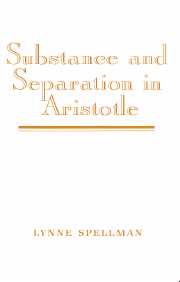I - The Separation of Platonic Forms
Published online by Cambridge University Press: 04 December 2009
Summary
And Socrates gave the impulse to this theory, as we said before, by means of his definitions, but he did not separate them from the particulars; and in this he thought rightly, in not separating them. This is plain from the results; for without the universal it is not possible to get knowledge, but the separation is the cause of the objections that arise with regard to the Ideas.
(Metaphysics XIII 9 1086b2–7)That Aristotle criticizes Plato for separating the Forms is a fact known to every reader. However, what exactly it is that Aristotle wants to criticize has, until recently, seldom been discussed explicitly and at length, and indeed as exploration of the question has occurred, views have differed considerably. It has been proposed by some interpreters that when he criticizes Plato for separating the Forms, by ‘separation’ Aristotle means their independent existence, that is, their capacity for existing even if there were no sensible objects. But other interpreters have held that he means their numerical distinctness from sensible objects, and some writers have thought that he means both of these.
Thus despite the considerable importance Aristotle places on Plato's separation of the Forms, there is disagreement about just what he is objecting to.
- Type
- Chapter
- Information
- Substance and Separation in Aristotle , pp. 5 - 20Publisher: Cambridge University PressPrint publication year: 1995



